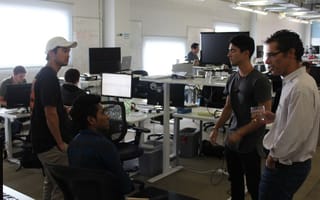
We’re all well aware of just how far LA tech has come, but if you’re looking for more reasons to get excited about the local tech scene, all you have to do is look at the diverse group of leaders putting LA on the map. Here are four of LA tech's CEOs you should know weighing in on how they maintain company culture as they scale, as well as their hiring philosophies.
TaskUs has come a long way since its 2008 launch, and CEO Bryce Maddock is the first person share the details of their journey. With plans to hire a number of new employees in the company’s palatial Santa Monica headquarters, it’s also gearing up to launch new service centers around the world.
Describe a major challenge you’ve faced as a leader and what you learned from it.
When we were just starting out, Jaspar Weir, president of TaskUs, and I had no money and no connections. But what we lacked in capital and network we made up for in passion and perseverance. Instead of opening our own operations, we started by cold calling call centers around the world and convincing them to let us hire their idle staff for a discount.
We then networked aggressively, going to startup mixers in Los Angeles and compelling other early-stage founders to give us a shot at doing their back office and customer service work. A few of our friends had really successful startups and as they started to grow, we grabbed onto their coattails and held on for dear life, building customer service teams as fast as we could. Eventually, we saved up enough money to open our own operations and today we have 8,000 full-time employees worldwide. The lesson here is simple: as an early-stage entrepreneur your most valuable resource is your own gumption; you make it happen.
How do you build and sustain great teams?
First, you must have a disciplined hiring process. At TaskUs, we put every new hire through a rigorous interview process that includes a multi-hour tandem interview with two of our top executives. The longer the interview goes the better, as people tend to start showing their true selves after hour three. Some might say we hire too slowly, but it’s worth it. The difference between a good hire and a truly exceptional hire is not incremental, it is exponential.
Next, you have to develop a culture of consistent feedback. At TaskUs, we do performance appraisals every quarter. This seems tedious, but we have found it forces routine and tough conversations, as well as well-deserved praise. It is uncomfortable to be told you are not meeting expectations, and that is good. Discomfort leads to action and action leads either to results or to the person in question leaving the company, both of which I consider a win.
What are your big plans and expectations for 2018?
2018 is about continuing to go global — we’re opening new offices all over the world, starting right here in Los Angeles. At the end of 2017, we launched TaskForceOne, our global headquarters at the Santa Monica Airport. As part of TaskForceOne, we also launched an Incubation Lab that is being used by LA- and San Francisco-based technology companies to test their operations before scaling into one of our other offices. In addition, we are opening two new offices in the U.S. to service our clients’ domestic customer experience needs, two offices in Asia, and we are scaling our operations in Baja, Mexico, to provide bilingual support.
Bridg founder and CEO Amit Jain is no stranger to the tech community, but it is the first time he’s acted as CEO. Though his past experiences include stops at Google — where he helped found Google Advisor — and Savings.com, among others, Jain admitted that, while rewarding, being a CEO poses unique challenges.
Describe a major challenge you’ve faced as a leader and what you learned from it.
Making decisions too late. It’s easier to see in hindsight, but as a CEO, I’m making decisions about these three things: people, product and market. In order to do that right, you have to make more correct decisions in a timely manner. As I grow, these decisions become more clear, and I am able to get there more quickly.
How do you build and sustain great teams?
You only look for people who are hungry to learn and are very aspirational; people who want to do something great. I take much pride in hiring people at Bridg who have the gene to take risks. I focus on bringing pillars into our team, people who inspire their departments, provide reliability and have the potential to be the next leaders in the industry.
I try to give people the opportunity to learn and lead on their own. It’s better than micromanaging along the way and it facilitates growth and independence. A consistent culture of strong team-building continues to help us recruit great people.
What are your big plans and expectations for 2018?
We are turning from a startup into a business. Our goals are to build a cultural fabric that allows the company to grow. I want new people to get plugged-in more easily and think more creatively about establishing a unique culture, as well as getting more involved in our larger community.
Founded in central London, Smarkets chose Los Angeles to be its U.S. headquarters. In the past year, founder and CEO Jason Trost, has worked to rapidly grow the company’s U.S. presence, while retaining its unique company culture, something that is difficult with two headquarters on two different continents.
Describe a major challenge you’ve faced as a leader and what you learned from it.
I think one of the biggest threats we face when it comes to our continued growth and wider industry impact is ourselves and how we go about growing. I’m sure a lot of CEOs say this, but I genuinely believe we have a unique culture and are building something special at Smarkets.
However, it has been difficult to retain a really close-knit feel as the size of our team has tripled. Now, we work to retain aspects of our culture that make our company a fun and friendly place to work. I think, if you put inter-company relationships too low on the priority list during your expansion years, your company ethos can get detached. It’s something that’s often front and center in my thoughts, especially because Smarkets employees are self-managed with no formal hierarchy or structure. In spite of our fast growth in recent years, I’ve ensured that we have retained a number of traditions from those early startup days, such as making sure the whole company eats lunch together (and not at our desks), as well as celebrating our successes along the way via end-of-the-month parties.
How do you build and sustain great teams?
Our cultural philosophy has always been about giving our employees the chance to fully unlock their potential; we want people to bring their whole selves to work every day. One of the ways we do this is through the structure of our company, which we see as more of a network model rather than a traditional top-down hierarchy. We recognize seniority, but we have leaders, not managers. Teams here are organically created around specific business needs, and movement within these teams is fluid. For example, all of our desks are on wheels so teams can organize themselves efficiently to solve a specific problem.
Especially important to us is empowering our software engineers — we are a tech company first, and all of our tech teams are lead by engineers, as they will have the most hands-on knowledge of how to tackle certain challenges.
With regards to hiring, we look for people who are smart, open-minded and interested in making an impact. We place a lot of emphasis on a comprehensive hiring process with a very high bar for acceptance. Once a hire starts at Smarkets, we have a very immersive onboarding, which means that everyone — technical or not — gets a solid grasp of the whole business and the challenges we face. Things like this, and focusing a great deal on our internal culture, mean our turnover rate is pretty low. I’m proud of that.
What are your big plans and expectations for 2018?
Our overall mission has always been clear: establish ourselves as a top-tier technology company. The biggest priority for 2018 is to secure our LA office as a presence in the local tech community. We have a unique product offering and complex challenges to attract high-level engineering talent as we roll out an aggressive hiring plan.
In addition, we’re looking to double headcount and customer numbers this year. From a product perspective, 2018 will be a milestone year. On a higher level, we will be designing and deploying a new mobile app before this summer and we are expanding our product for entry into new markets. Legal sports betting in America will be a game changer. We’re already working on a sports betting platform to be ready for entry into this huge market and we’re confident it’s going to explode.
After graduating college, Nanxi Liu co-founded Nanoly Bioscience, a company that developed a polymer designed to enable vaccines to survive without refrigeration. In 2012, the same year she co-founded Nanoly, she co-founded Enplug, a software company that allows businesses to manage and distribute content on displays, and while things might have been rocky early on, Liu and her team were able to bounce back, something that is still a major part of the company’s culture today.
What’s a major challenge you’ve faced as a leader, and what did you learn from it?
Two years after we started, we came close to running out of money because we were in the "hyper growth" mentality. To save ourselves from going under, we immediately shifted our team to focus on becoming cash-flow positive. To get there, we only marketed to our most profitable customer bases, became more data-driven, automated more tasks and rigorously managed our expenses. We learned to become a smarter and better business because of it. Since then, we have grown our revenues significantly each year since, remained cash flow positive and became profitable.
How do you build and sustain great teams?
Our strategy for building and sustaining a strong Enplug team is placing a lot of energy into the hiring process and then ensuring our teammates find fulfillment in their work. We have a rigorous hiring process to screen for exceptional people. We look for people who have the skills to excel, a hunger to learn and achieve and a desire to contribute to our culture.
To keep a great team, we take care of our people and make sure they know how their work makes an impact on our business. We organize lots of fun team outings and we encourage our teammates to bring their families and significant others along. To align our team goals, we have rewards and bonuses that are given to everyone when the company reaches sales and product milestones.
What are your big plans and expectations for 2018?
We've seen tons of growth with companies adding digital displays into their offices to improve internal communication, so we think 2018 will be a big year for us. We started a new Japan operation in 2017, so this year we'll be seeing major growth in Japan. We on-boarded some of our largest clients in the first week of this year so we expect to continue our trend of signing on more and more Fortune 500 clients the rest of 2018. Overall, we plan to double our revenue, remain profitable and significantly grow the number of displays running Enplug software. And we expect our teammates to make a lot of money this year.








